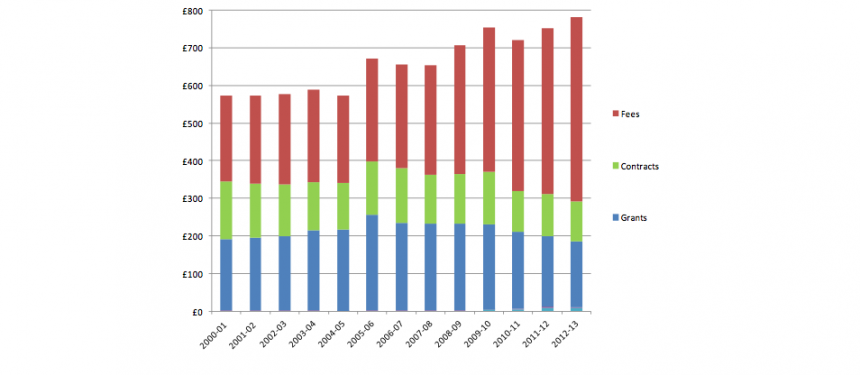In the most detailed external appraisal of the British Council since the 1970s, the Foreign & Commonwealth Office (FCO) has published a Triennial Review report on the British Council calling for more transparency, accountability and clarity of purpose.
News and business analysis for Professionals in International Education
Have some pie!
FCO report calls for more transparency in British Council
 British Council income in real terms (GBP millions)
British Council income in real terms (GBP millions) The review found damaging perceptions among stakeholders that the organisation is primarily motivated by income generation and conflicts of interest among its activities aimed at supporting UK providers while still being commercially sustainable.
The FCO has called for greater separation between income generating activities and public services
The FCO looked into claims that the British Council could and should do more to help UK providers in foreign markets specifically in ELT and exam delivery.
“We found no evidence of any deliberate policy or centrally approved practice of stifling competition or competing unfairly against other UK providers,” it states. However, the FCO has called for greater separation between income generating activities and public services.
The British Council’s current operation model shows nearly 80% of income is generated through English teaching and other educational activities with remaining funding coming in the form of tax-funded grants from the FCO.
The level of grant funding has fluctuated in recent years due to efforts to cut the UK budget deficit. Last year the British Council received £172 million in government aid on par with 1998-1999 levels.
Self-generated income from mostly ELT and exam operations has risen by over £100 million since 2010 and is predicted to increase by a further £100 million by 2015– “well beyond levels needed” to compensate funding cuts the report said.
The Review offered three potential pathways to achieve greater separation and transparency: internal administrative separation, including financial reporting, establishment of a government-owned company (GovCo) for income generating activity (reporting to the FCO), or establishment of a suitable commercial, legal entity for income generating activity.
A cross-Government Steering Group will start work this month to assess options and make recommendations to ministers about a future operating model.
The report also recommended transferring responsibilities of providing business development support and opportunities to UKTI while the British Council maintains an advisory role.
Chair of the British Council, Sir Vernon Ellis commented: “While we welcome the review’s conclusions about the contribution the British Council makes to the UK, we agree that our significant growth and the increased importance and complexity of our relations with government and other stakeholders has given rise to a number of important issues that need to be addressed.
“We recognise the concerns which have been raised and have already started to take action on several of its main themes.”
“We recognise the concerns which have been raised and have already started to take action on several of its main themes”
The review took into account views from around 1,200 individuals and organisations including government ministers, British Council trustees, staff and advisors, head of UK diplocmatic missions and other interested parties in the UK and overseas.
Further findings lauded the British Council’s role in promoting the UK abroad saying it is a “valuable national asset and should be maintained as main official UK body for cultural diplomacy”.
It concluded that art, education and English should continue to be the main areas of business for organisation with science and technology given higher priority than they currently have.
Established in 1934 to promote understanding of the UK across the world, the British Council has had a Royal Charter since 1940 and became a registered charity in 1962.
Still looking? Find by category:



“Self-generated income from mostly ELT and exam operations has risen by over £100 million since 2010 and is predicted to increase by a further £100 million by 2015– “well beyond levels needed” to compensate funding cuts the report said.”
The report actually says “significantly beyond levels needed simply to replace the ‘lost’ Grant-in-Aid”. For indeed it is significant. Readers of this paper who work in international education could be forgiven for wondering why a large organisation enjoying significant growth – faster I dare say than most – should be granted half a million pounds a day of taxpayers’ cash in addition to government contracts, and other material governmental support and benefits. The British Council now says it recognises the concerns which have been raised. That can be no surprise as the concerns have been articulated by many people and institutions at home and abroad for many years. With the critique now in black and white and coming from their paymasters at the FCO, the British Council is now “already” taking action. It must be very doubtful, however, whether the new Steering Group will be able to put forward an operating model whereby this organisation, with a comfortable base load of £300 million in grants and government contracts, with government branding, royal charter, use of diplomatic premises, enjoying civil service pensions, tax breaks (including ownership of multiple overseas companies) and UK charitable status can ever compete fairly with businesses that operate in the real world. But yes, let’s start with “transparency, accountability and clarity of purpose” – qualities which would, if implemented, mark an important change of culture, and be a step in the right direction in helping everyone to understand the competition issues and the conflicts of interest that are endemic in the present organisation.